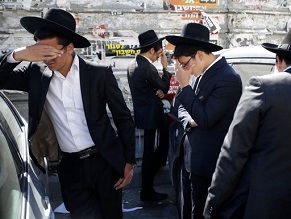|
World Jewish News

Followers of Rabbi Ovadia Yosef mourned on Monday outside his home in Jerusalem
|
Rabbi Ovadia Yosef, Influential Spiritual Leader in Israel, Dies at 93
07.10.2013, Israel Rabbi Ovadia Yosef, who as the spiritual leader of the ultra-Orthodox Shas Party became a fiery figure in Israeli politics championing the interests of Jews of Middle Eastern and North African origin, died here on Monday. He was 93.
His death was announced by Avigdor Kaplan, the director of the Hadassah Medical Center in Ein Kerem in Jerusalem, where the rabbi had been treated. It set off a huge outpouring of mourning and one of the biggest events the city has ever seen.
By police estimates 700,000 people — almost a 10th of the population of Israel — swept into the streets and onto rooftops along the route of the funeral procession, many of them chanting prayers and tearing their clothes in a show of grief that brought much of the city to a standstill.
The van carrying Rabbi Yosef’s body took more than four hours to inch its way through the throng, mostly men and boys in black Orthodox dress, on its short journey from the Porat Yosef yeshiva in the Geula neighborhood to the Sanhedria cemetery, where the rabbi was buried shortly before 11 p.m.
Rabbi Yosef, instantly recognizable by his lush gray beard, gold-embroidered robe, turban and dark glasses, embodied a particular blend of religion, tradition, populism and ethnicity. As the leader of a Sephardic council of Torah sages that founded Shas in the early 1980s, he harnessed the underdog sentiment of many non-European Israeli Jews, worked to restore their pride and turned them into a potent political force.
Shas became a major player in governing coalitions under Rabbi Yosef’s leadership; Israeli leaders of all stripes made pilgrimages to his home in Jerusalem seeking his support. As a Sephardic Torah scholar and arbiter of Halakha, or Jewish law, he was often described by his followers as “the greatest of the generation.” He wrote Talmudic commentaries and volumes of answers, known as responsa, to questions on religious law. In 1970 he was awarded the prestigious Israel Prize for Torah literature.
Prime Minister Benjamin Netanyahu of Israel said on Monday that “the Jewish people have lost one of the wisest men of this generation,” adding, “Rabbi Ovadia was a giant in Torah and Jewish law and a teacher for tens of thousands.”
President Shimon Peres of Israel said he was at the rabbi’s bedside hours before the death. “When I pressed his hand, I felt I was touching history,” he said, “and when I kissed his head, it was as though I kissed the very greatness of Israel.”
Yossi Elituv, editor of the Orthodox family magazine Mishpacha and co-author of a book about the life and works of Rabbi Yosef, said that the rabbi’s greatness in interpreting religious law was based on his chronicling of rulings of the last 200 years and the boldness with which he issued his own, often lenient rulings, sometimes on sensitive issues that other rabbis dared not approach.
“Life challenges the Torah with questions because the world changes, and those changes need to be contended with,” Mr. Elituv said. “Rabbi Ovadia took on every mission.”
In one landmark ruling that challenged the traditional Ashkenazi Orthodox camp, Rabbi Yosef determined that it was permissible for Israel to concede territory in return for true peace, based on the halachic principle that saving lives comes above all. But he and Shas began to take a more hawkish line, especially after 2000, as the peace process dissolved into the violence of the second Intifada. The Palestinians’ intentions were not genuine, he said.
In another unconventional ruling, the rabbi allowed hundreds of women whose husbands were missing after the 1973 war to remarry, although, traditionally, remarriage is allowed only after a woman has received a religious bill of divorce from her former husband or there is incontrovertible proof that her former husband has died.
Rabbi Yosef’s weekly sermons, delivered on Saturday nights after the Sabbath, were broadcast by satellite to wide audiences and in the last few years were uploaded to YouTube. While dealing with the intricacies of the laws of the Sabbath and festivals, the sermons also became the rabbi’s platform for lashing out against those he despised — rival politicians, gays and perceived enemies of Israel.
By ISABEL KERSHNER
The New York Times
|
|
